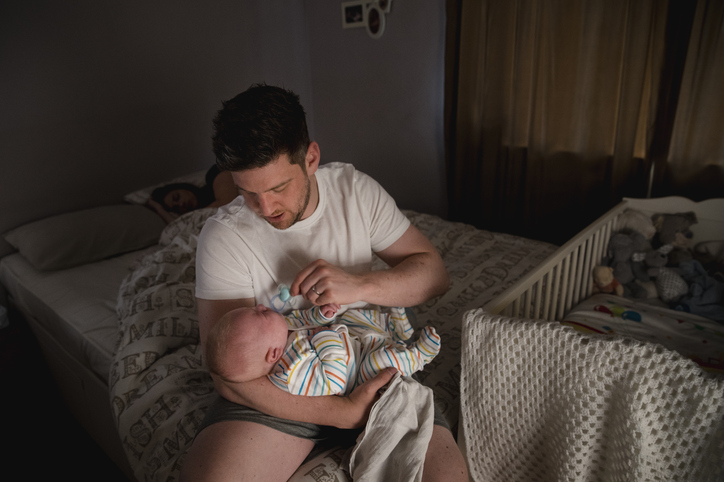Fatherhood is often painted as a joyful, life-changing experience. While that’s true in many ways, there’s another side of the story that doesn’t get enough attention—the mental health challenges that can come with being a dad. If I’m being honest, it’s something I didn’t fully anticipate when I held my first child in my arms. I felt love, pride, and excitement, but also a strange mix of fear, uncertainty, and pressure that I didn’t know how to handle. What I’ve since learned is that I’m not alone. There’s a hidden link between fatherhood and mental health that many men experience but rarely talk about.
The Weight of Expectations
Becoming a dad comes with a shift in identity. Overnight, you’re no longer just you—you’re someone’s father. That title carries a heavy weight. Society often paints dads as the rock of the family, the provider, the protector. And while those roles are important, they can also feel overwhelming. I’ve felt the pressure to always be strong, to never falter, and to keep everything together no matter what. But the truth is, those expectations can take a toll on any man’s mental health.
I remember the first time I had to figure out how to balance my career demands with being there for my family. It felt like I was being pulled in two directions, and no matter what I chose, I felt like I was failing. When you’re trying to be everything for everyone, it’s easy to lose sight of yourself. That’s how burnout starts to creep in.
Sleepless Nights and Emotional Strain
One of the biggest challenges I faced as a new dad was sleep deprivation. Nobody warns you just how much the lack of sleep can mess with your mind. On the surface, I told myself I was fine—just a tired dad adjusting to the demands of a newborn. But underneath, the exhaustion was amplifying every worry, every doubt, and every insecurity I had about being a father.
There were nights when I was up at 2 a.m., holding a crying baby in one arm while Googling things like “why won’t my baby stop crying” with the other. I felt helpless and inadequate. And while I knew deep down that I was doing my best, it didn’t stop those nagging thoughts from telling me I was failing.
What surprised me most was how emotional fatherhood made me. I wasn’t expecting to feel everything so deeply—the joy, the frustration, the fear, the love. It’s like becoming a dad flipped a switch I didn’t even know existed. But with those emotions also came moments of intense vulnerability. I realized how much I had bottled up over the years, and suddenly, it all came flooding out.
The Stigma of Talking About It
One of the hardest parts about dealing with mental health as a dad is the stigma. Growing up, I was taught to “man up” and push through challenges without showing weakness. But the truth is, bottling up emotions doesn’t make them go away—it just builds pressure until something cracks.
It took me a long time to realize that asking for help isn’t a sign of weakness—it’s a sign of strength. But even knowing that, it’s hard to open up. I didn’t want to burden my partner, who was already dealing with her own challenges of motherhood. And I didn’t know how to bring up the topic with friends, because it’s not something we typically talk about.
I’ve since learned that I’m not alone in feeling this way. Studies show that men are far less likely to seek help for mental health issues than women, and dads in particular often feel the need to “tough it out” for the sake of their family. But ignoring the problem doesn’t make it go away—it just makes it harder to cope.
The Impact on Relationships
Fatherhood can bring couples closer together, but it can also introduce new strains into a relationship. My wife and I quickly learned that sleep deprivation, endless diaper changes, and the constant demands of a newborn aren’t exactly conducive to quality couple time. We went from romantic date nights to barely having five minutes to sit down and talk.
I’ll admit, there were times when I felt disconnected from her, and I know she felt the same. It’s not that we didn’t love each other—we were just so focused on surviving the day-to-day challenges of parenting that everything else took a back seat. The key for us was learning to communicate openly, even when it was hard. It wasn’t always smooth sailing, but making the effort to check in with each other made a huge difference.
Finding Joy in the Small Moments
Despite the challenges, fatherhood has also brought me some of the most rewarding experiences of my life. There’s nothing quite like the feeling of your child running to you with a big smile or hearing them say “I love you” for the first time. Those moments make all the sleepless nights and self-doubt worth it.
One thing I’ve learned is that it’s important to be present in those moments. It’s easy to get caught up in the chaos of everyday life, but taking the time to slow down and really appreciate the little things has helped me stay grounded. Whether it’s reading a bedtime story, playing hide-and-seek, or just simply sitting together and watching a cartoon, those small acts of connection have a big impact.
Breaking the Cycle
As a dad, I want to set a positive example for my kids—not just in how I treat others but also in how I take care of my own self. I’ve learned that prioritizing my mental health isn’t selfish—it’s essential. When I’m in a good place mentally, I’m a better father, husband, and person overall.
One of the most important steps I took was reaching out for support. For me, that meant talking to a therapist, leaning on friends, and being open with my partner about how I was feeling. It wasn’t easy at first, but it made a world of difference. I’ve also made an effort to take better care of my physical health, whether that’s going for a run, eating healthier, or simply taking a few minutes each day to breathe and reset.
Fatherhood is an incredible journey, full of rewarding moments but also its share of challenges. The connection between being a dad and mental health is important, and it’s a conversation we need to have more often. Remember, you’re not alone—every dad faces struggles, and asking for help is a sign of strength, not weakness.
For me, becoming a father has been a profound lesson in resilience, vulnerability, and growth. It’s taught me to embrace both the highs and lows, to be kinder to myself, and to find joy in the chaos. I’ve learned to prioritize my mental health while staying present and engaged as a dad. This journey has revealed what truly matters in life, and for that, I’m endlessly grateful. I wouldn’t trade this experience for anything.


